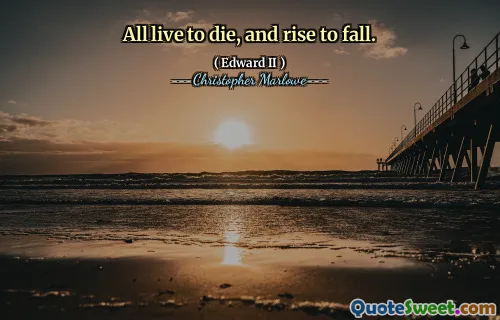Edward II, a historical drama by Christopher Marlowe, explores the reign and tumultuous life of King Edward II of England. The play highlights themes of power, favoritism, and the consequences of personal desires on political stability. Edward's obsessive affection for his favorite, Piers Gaveston, leads to conflict with the nobility, who resent Gaveston's influence on the king. This strain helps to illustrate the tensions between personal relationships and the responsibilities of a monarch.
The narrative delves into the king's struggle to maintain his authority against rising opposition. As the plot unfolds, Edward's inability to navigate the political landscape results in tragic consequences for his reign, highlighting the fragility of power and the fallout from his decisions. The tension escalates as rival factions vie for control, illustrating the brutal realities of medieval politics.
Ultimately, Edward II serves as a poignant examination of love, loyalty, and betrayal. The characters are richly drawn, with their motivations and conflicts driving the story forward. The play concludes with Edward's downfall, emphasizing the moral that personal attachments and neglect of duty can lead to ruin. It remains a compelling portrayal of a king's tragic journey and the intricate interplay between personal desires and political imperatives.
More »
Today Birthdays
1955 -
Max Lucado
1946 -
John Piper
1842 -
William James
1907 -
Abraham Joshua Heschel
1887 -
Aldo Leopold
1755 -
Alexander Hamilton
1976 -
Alethea Kontis
1971 -
Mary J. Blige
1825 -
Bayard Taylor
1943 -
Jim Hightower
1885 -
Alice Paul
1923 -
Carroll Shelby
1928 -
David L. Wolper
1954 -
Kailash Satyarthi
1972 -
Amanda Peet
1946 -
Naomi Judd
1970 -
Malcolm D. Lee
1955 -
Christian Marclay
1973 -
Rahul Dravid
1987 -
Jamie Vardy
1942 -
Clarence Clemons
1992 -
Fatima Sana Shaikh
1948 -
Larry Harvey
1930 -
Rod Taylor
